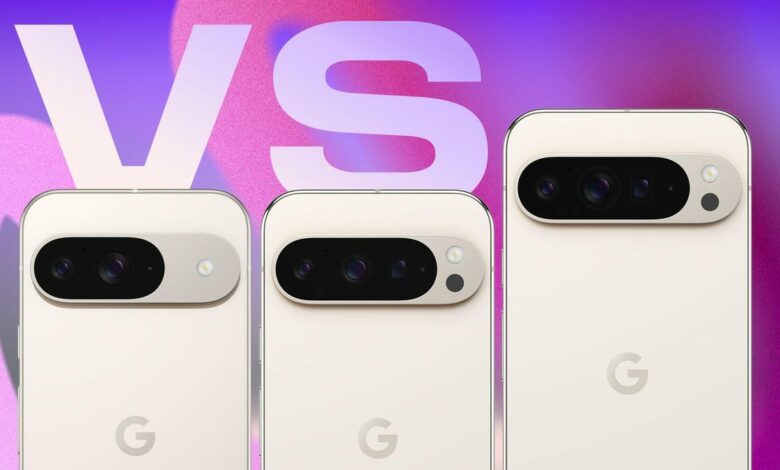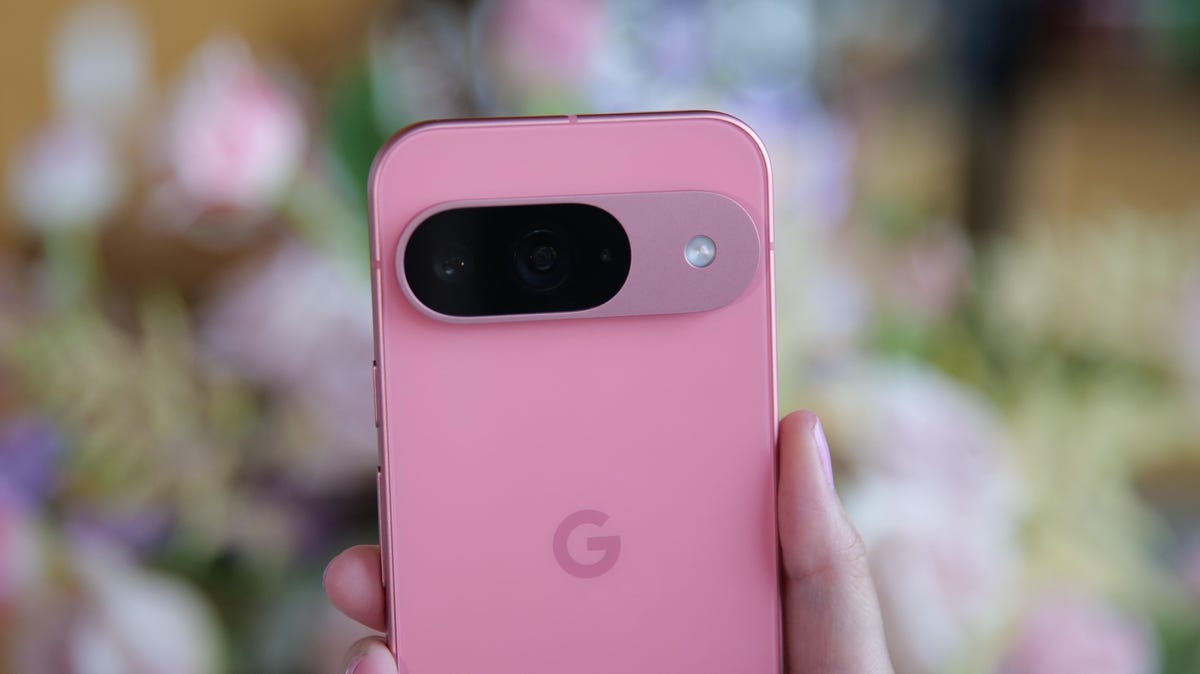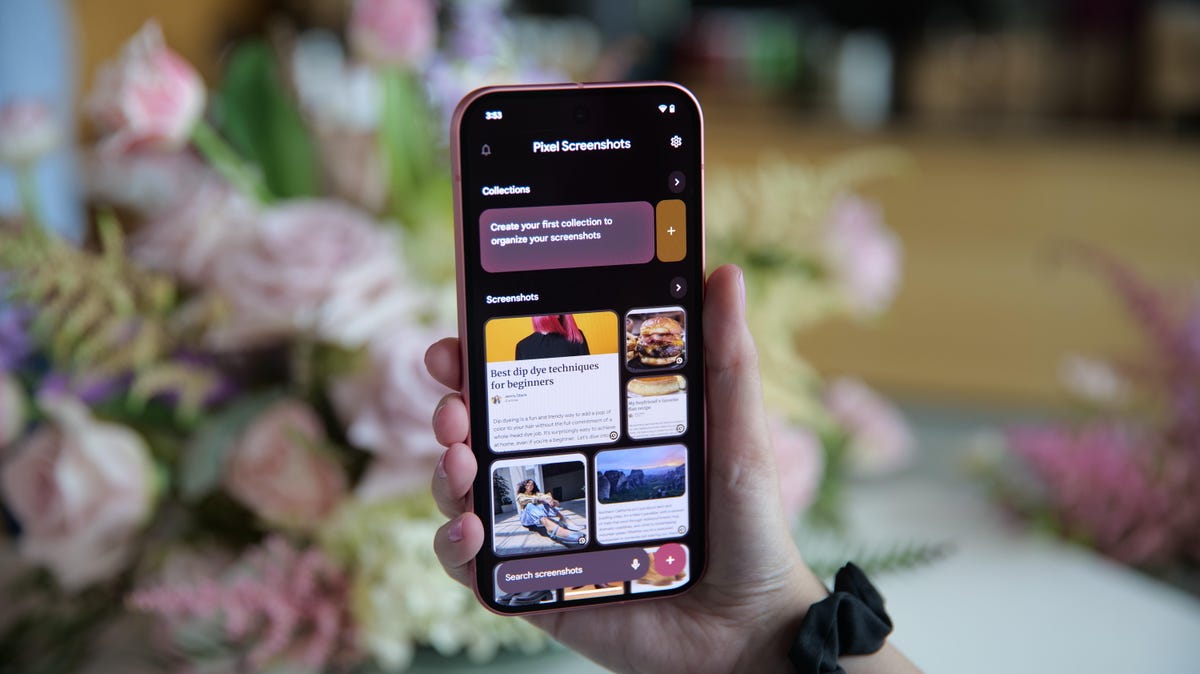Pixel 9 specs vs Pixel 9 Pro, 9 Pro XL: All Google’s new phones compared




During the Pixel 9 launch event, Google releases its latest flagship phones, and aside from adding a smaller Pro model, the search giant has a few changes to its lineup. Here’s how the Pixel 9 Specifications compared to its premium siblings, the Pixel 9 Pro and Pixel 9 Pro XL.
On paper, the Pixel 9 series are the most powerful phones Google has released to date. Alongside the new Google-designed Tensor G4 chipset, the phones pack bigger storage and battery capacities and feature larger displays. But they’re also more expensive, with each model getting a $100 price bump, with the Pixel 9 starting at $799, the Pixel 9 Pro starting at $999 and the Pixel 9 Pro XL starting at $1,099.
The price hikes for Pixel phones continue: just two years ago, the Pixel 7 launched at $599. Google’s phones have gotten more powerful and added AI features, and the Pixel 9 series comes with the same seven-year Android software and security update promise as its predecessor (the Pixel 7 will predate both, in 2025).
As mentioned above, there are three phones in the Pixel 9 family: the base Pixel 9, the new Pixel 9 Pro, and the larger Pixel 9 Pro XL. The two smaller phones are the same size, roughly the same weight, and have the same battery capacity, but they differ in cameras, display sharpness, and RAM.

The Pixel 9’s new camera bar.
The Gemini AI features are a big difference in the Pixel 9 series compared to its predecessors, and all three phones get the same ones. As Google detailed at its I/O developers conference, many of these AI tools are meant to improve your day-to-day life — do things like take a photo of the contents of your fridge and ask the company’s Gemini chat assistant what meals you should make. While Magic Eraser has been a mainstay of camera software for years, the new Add Me mode uses AR to combine multiple images so that everyone can be in one photo.
The big differences between the Pixel 9 phones, then, are in the hardware. While all three phones share the same Google Tensor G4 chipset, the base Pixel 9 has 12GB of RAM and either 128GB or 256GB of storage. The Pixel 9 Pro and Pixel 9 Pro XL have 16GB of RAM and come in 128GB, 256GB, 512GB, and 1TB configurations.
The base and premium models also differ in terms of display sharpness. The Pixel 9 has a 6.3-inch OLED display with a resolution of 2,424×1,080 pixels for a 422 pixels per inch density (and a variable refresh rate of 60-120Hz); on the other hand, the Pixel 9 Pro’s 6.3-inch LTPO OLED display of the same size has a resolution of 2,856×1,280 pixels for a 495 ppi density, while the larger Pixel 9 Pro XL’s 6.8-inch LTPO OLED display has a 2,992×1,344 pixels for a 486 ppi density, presumably resulting in sharper images. Both of the latter premium phones have a variable refresh rate of 1-120Hz, allowing them to throttle the screen refresh rate to save battery life.

A Pixel 9 with the new Pixel Screenshots app, which lets you find useful information in screenshots.
Battery size is where the size difference comes into play. The Pixel 9 and Pixel 9 Pro have 4,700mAh batteries, while the larger Google Pixel 9 Pro XL has a 5,060mAh battery.
Cameras, however, are sorted along a basic versus premium line. The Pixel 9 has a 50-megapixel main camera on the back and a 48-megapixel ultra-wide camera, along with a 10.5-megapixel front-facing camera. The Pixel 9 Pro and Pixel 9 Pro XL have the 50-megapixel main camera and the 48-megapixel ultra-wide camera, as well as a 48-megapixel telephoto camera with 5x optical zoom, along with a 42-megapixel front-facing camera. All three phones can record video in 4K.

Here you see the Pixel 9 Pro (left) and the Pixel 9 Pro XL.
All three phones will launch with Android 14 and, as previously mentioned, will get seven years of operating system and security updates. That means the phones won’t launch alongside the upcoming Android 15, likely due to Google’s decision to push their release to August, ahead of the usual October launch for new Pixel phones — but the company has assured that the Pixel 9 series will get Android 15. They will also come with Satellite SOS, Google’s new satellite emergency contact service that competes with Apple’s iPhone-only Emergency SOS.
For more details on exactly how the Pixel 9 phones compare to each other, check out CNET’s detailed spec sheet below:
Pixel 9 specs vs Pixel 9 Pro, Pixel 9 Pro XL
| Google Pixel 9 | Google Pixel 9 Pro | Google Pixel 9 Pro XL | |
| Screen size, technology, resolution, refresh rate | 6.3-inch OLED; 2,424×1,080 pixels; variable refresh rate of 60-120 Hz | 6.3-inch LTPO OLED; 2,856×1,280 pixels; variable refresh rate of 1-120Hz | 6.8-inch LTPO OLED; 2,992×1,344 pixels; variable refresh rate of 1-120Hz |
| Pixel density | 422 ppi | 495 ppi | 486 ppi |
| Dimensions (inches) | 6×2.8×0.3 inch | 6×2.8×0.3 inch | 6.4x3x0.3 inch |
| Dimensions (millimeters) | 152.8x72x8.5mm | 152.8x72x8.5mm | 162.8×76.6×8.5mm |
| Weight (gram, ounce) | 198 grams | 199 grams | 221 g (7.8 oz) |
| Mobile software | Android 14 | Android 14 | Android 14 |
| Camera | 50 megapixel (wide), 48 megapixel (ultra wide angle) | 50 megapixel (wide), 48 megapixel (ultra wide angle), 48 megapixel (5x telephoto) | 50 megapixel (wide), 48 megapixel (ultra wide angle), 48 megapixel (5x telephoto) |
| Front camera | 10.5 megapixels | 42 megapixels | 42 megapixels |
| Video recording | 4K | 4K | 4K |
| Processor | Google Tensor G4 | Google Tensor G4 | Google Tensor G4 |
| RAM/Storage | 12GB RAM + 128GB, 256GB | 16GB + 128GB, 256GB, 512GB, 1TB | 16GB + 128GB, 256GB, 512GB, 1TB |
| Expandable storage | No | No | No |
| Battery | 4,700 mAh | 4,700 mAh | 5,060 mAh |
| Fingerprint sensor | Below display | Below display | Below display |
| Connection piece | USB-C | USB-C | USB-C |
| Headphone jack | No | No | No |
| Special features | Satellite SOS; 7-year OS, security and Pixel function loss; Gorilla Glass Victus 2 cover glass; IP68 dust and water resistance; 2700-nit peak brightness; 45W fast charging (charger not included); 15W wireless charging with Google Pixel Stand (2nd generation); 12W wireless Qi charging; Wi-Fi 6 and Wi-Fi 7; NFC; Bluetooth 5.3; Dual SIM (eSIM + nano SIM); Add me; Best Review; Magic Eraser; Magic Editor | Satellite SOS; 7-year OS, security and Pixel feature losses; IP68 dust and water resistant; Video Boost with 8K Upscaling; Macro Focus on ultra wide angle; Gorilla Glass Victus 2 cover glass; 3000 nit peak brightness; 45W fast charging (charger not included); 15W wireless charging with Google Pixel Stand (2nd generation); 12W wireless Qi charging; Wi-Fi 6 and Wi-Fi 7; NFC; Bluetooth 5.3; Dual SIM (eSIM + nano SIM); Add Me; Best Take; Magic Eraser; Magic Editor | Satellite SOS; 7-year OS, security and Pixel feature losses; IP68 dust and water resistant; Video Boost with 8K Upscaling; Macro Focus on ultra wide angle; Gorilla Glass Victus 2 cover glass; 3000 nit peak brightness; 45W fast charging (charger not included); 15W wireless charging with Google Pixel Stand (2nd generation); 12W wireless Qi charging; Wi-Fi 6 and Wi-Fi 7; NFC; Bluetooth 5.3; Dual SIM (eSIM + nano SIM); Add Me; Best Take; Magic Eraser; Magic Editor |
| The US price starts at | $799 (128GB) | $999 (128GB) | $1,099 (128GB) |
| The price in the UK starts at | Converts to £640 (128GB) | Converts to £780 (128GB) | Converts to £860 (128GB) |
| Australia prices start at | Converts to AU$1,210 (128GB) | Converts to AU$1,510 (128GB) | Converts to AU$1,670 (128GB) |




